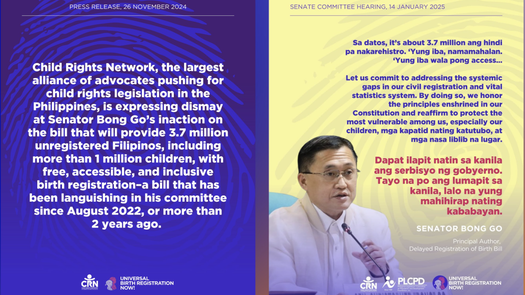July 29, 2025
August 15, 2024
Enhancing Demand for Civil Registration through People-Centered Campaigns in the Philippines

The Philippines’ current law on civil registration and vital statistics (CRVS) is extremely outdated and unresponsive to the conditions of present day, leaving more than 1.3 million children aged 14 and below and a segment of the adult population without birth registration. The current law has unclear provisions for late birth registration procedures and does not address the difficulties of complying to death registration processes, including prohibitive costs. It neither guarantees affordable CRVS procedures for users nor processing delays. And the treatment of cross-cultural marriage practices is murky.
The challenge is to make the system more efficient, modernized, inclusive and rights-based – giving it a real human dimension. That’s why in an unprecedented move early this year, and with funding from Bloomberg Philanthropies, the Global Health Advocacy Incubator (GHAI) worked with the Philippines Legislative Committee on Population and Development (PLCPD) to roll out a robust multimedia and outdoor campaign to support the passage of an omnibus bill for a universal, more inclusive and accessible civil registration system. The Omnibus CRVS bill addresses the needed alignment of national and sub-national tasks and accountabilities. The proposed bill will also tighten the procedures, ensure accuracy of information in registration and ensure a more universal and inclusive mechanism that allows everyone, regardless of their status, to gain access to the CRVS system.
PLCPD’s media and outdoor campaign, dubbed “Get Everyone in the Picture” aimed to make everyone count for better public health planning and delivery through a streamlined CRVS ecosystem. It centered on a unified message of “universal birth registration for all,” showcasing the narratives of affected individuals and the difficulties they confront. These include school-aged children who could not attend school simply because they have no birth certificate, or people as old as 82 who have never had documentation of their birth. But CRVS is not about birth registration alone. It involves all vital events as marriage, legal separation, child adoption and even death. It also covers consolidating data that is crucial in health planning and intervention based on vital events. These have constituted other themes of the campaign.
Civil society organizations (CSOs) are playing a proactive role in the uptake of societal issues such as CRVS. Amidst the competing priorities in the enactment of laws in the Philippines’ 19th Congress, the new CRVS bill and its importance need to take center stage. As a CSO, PLCPD became the soundboard for the people’s appeal to pass the new law. While the appeal targeted lawmakers, the campaign simultaneously enhanced the demand by solidifying the people’s awareness of the issue. Posters were carried by local rickshaws, a common transportation modality along the roads leading to the Congress grounds. The country’s transport association heeded the call to be the bearers of the campaign. Banners also lined up the road of a major highway in Manila.
PLCPD also took advantage of the passenger traffic in airport terminals that involves both the general public and lawmakers traveling from the regions throughout the country. Promotions graced TV screens in the pre-departure and arrival areas of airport terminals in Manila to popularize the issue and influence decision-makers to take urgent action on the proposed law.
Messages were rolled out not only in vital locations but more importantly conducted with strategic timing. The messages were put out just before the resumption of legislative hearings, and at significant events during the CRVS celebration in February. Social media blitzes also covered the milestone events.
Reinforcing the call to pass the new law, was the organization of the Universal Birth Registration (UBR) Caravan spearheaded by a city government as a CRVS champion. More than 200 beneficiaries flocked to the venue near the gates of Congress in Manila to take advantage of the free birth registration. It is no surprise, therefore, that many parliamentarians have been speaking more forcefully than ever before on the crucial need to pass the bill during the current sessions of the House of Representatives and Senate. The participation of the city government in the initiative is a testament to the need to address the national and sub-national system gaps that only the new law can address.
Local CSOs’ proactive role in public policy, as exemplified by PLCPD enabled traction in generating interest on CRVS in the Philippines, is a model of media advocacy that highlights the human dimension in the campaign. Bloomberg Philanthropies serves as a model for global development partners on how to invest in this successful model of supporting health security in low- and middle-income countries.



